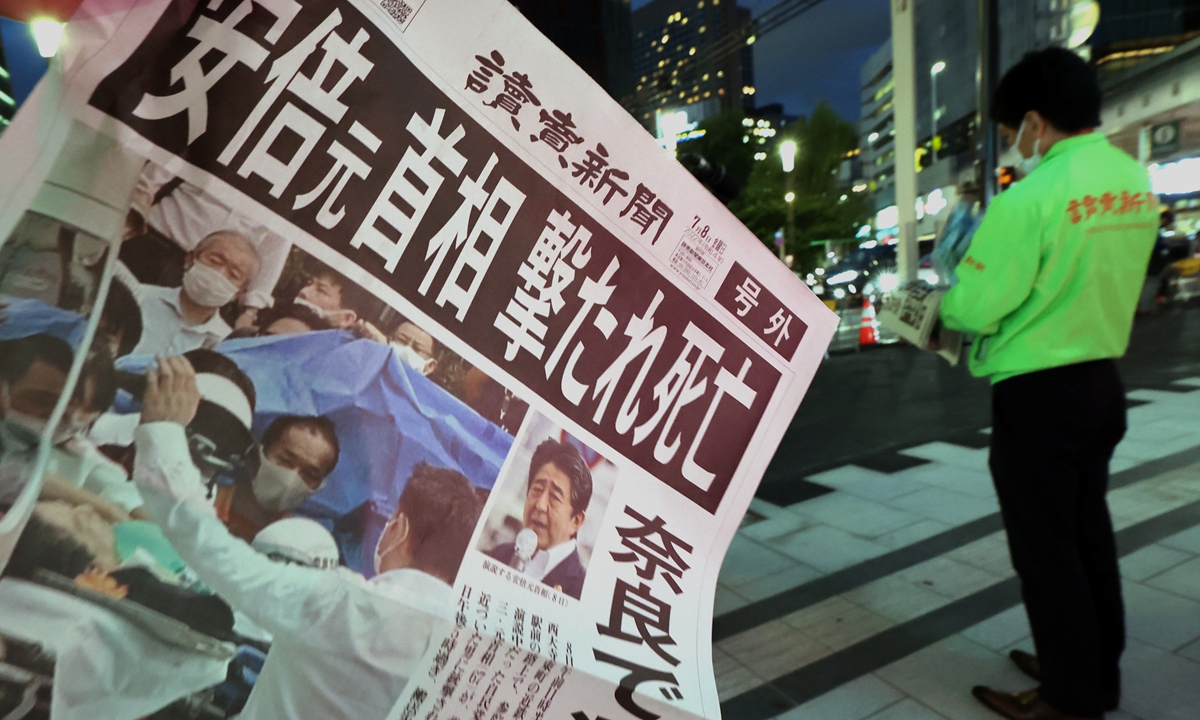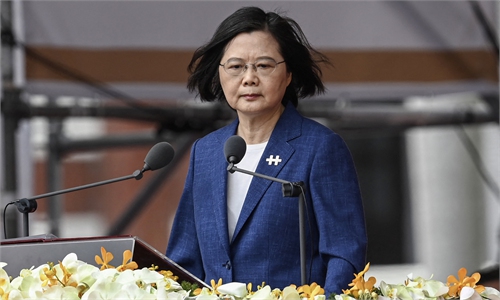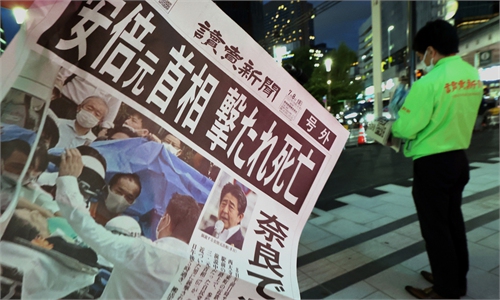Evaluation of Abe shouldn’t be blurred by political stances or geopolitical motives

Photo: CFP
The funeral of former Japanese prime minister Shinzo Abe, who was shot dead on July 8, was held on Tuesday at the Zojo-ji Temple in Tokyo. As Abe's assassination continues to shock Japan and the world, the evaluation of Abe has also sparked controversies due to different positions and values.US public broadcaster National Public Radio (NPR) has recently been ripped by conservatives due to its assessment of Abe. When reporting Abe's assassination, NPR described Abe as a "divisive arch-conservative." After facing a severe backlash from US conservatives, the media outlet was forced to delete such a description and referred to Abe as an "ultranationalist" instead.
"In fact, these American conservatives didn't seek for justice for Abe out of love or sympathy, but they did it because Abe has a close relationship with Donald Trump, an icon of conservatives," said Jiao Kun, a lecturer of the School of History at Wuhan University. This is the logic behind US conservatives' attacks on the NPR. Trump had a very good personal relationship with Abe: The Japanese former prime minister was among the first foreign leaders to call to congratulate Trump on his election. Conservatives argued the NPR was using Abe to attack Trump by portraying Abe as an arch-conservative.
NPR wasn't the only media outlet to assess Abe this way. CBS Mornings also called Abe a "polarizing figure" and "right-wing nationalist," whose "political opinions were controversial." Both CBS and NPR lean towards liberal positions, while the latter is a little more centrist.
Some US politicians and netizens commemorated Abe as an "anti-China fighter" or "a fighter against the CPC." Congressman Dan Crenshaw tweeted on Friday that "Abe was a fighter who recognized the threat from China and demanded unity in standing up to it. He will be missed but never forgotten." Such an evaluation of Abe is mainly driven by the geopolitical mindset of confronting China.
"In the context of intensifying competition between China and the US, Abe is a major trumpeter and flag-bearer of the US containment policy against China in the Asia-Pacific. Japan under Abe really served US interests, leading Washington to pay more attention to the role of Japan in containing China in the Asia-Pacific region," Zhang Tengjun, deputy director of the Department for Asia-Pacific Studies at the China Institute of International Studies, told the Global Times. After he left office, Abe stirred up more trouble on the Taiwan question with reckless remarks.
There are certainly different perspectives when it comes to how to define Abe's legacy. It's impossible to expect Chinese media and netizens to forget this when commenting on Abe's death. South Korean media and netizens also mentioned Abe's refusal to apologize over the "comfort women" issue.
But when Chinese media and web users pointed out negative aspects of Abe's political career, and analyzed objectively about the impact of Abe's death, they were accused of "shaping Abe's unpopular image." The Diplomat singled out a Global Times report which argued "Japanese right-wing forces may use this incident to push forward the trend of conservative transformation in Japanese politics" as "controversial" and "nationalist."
As the longest-serving prime minister in Japanese history, Abe is a complex and controversial politician. As the connection between Abe and conservative religious group Unification Church has been exposed, Abe's image has become increasingly complicated, adding another dimension to how to evaluate the conservative Japanese politician. The links between Abe and this religious group, derided as a cult by critics, are no secret. Last year, Abe recorded a congratulatory video message that was played to the "Rally of Hope" summit organized by an NGO that is run by the Unification Church.
Evaluating Abe Shinzo must be objective, rational, based on facts and multi-dimensional. Smear and attacks of objective evaluations by the media of Abe have been driven by either brainless political correctness or sinister geopolitical motives, which only mislead the public.


